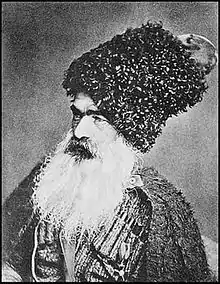< Wikijunior:Languages 
Who speaks it
Chechen is spoken by people in Chechnya.
Alphabet

A Chechen man
| Upper case | Lower Case | Name | English |
|---|---|---|---|
| А | а | ah | a (as in father) |
| Аь | аь | eah | ä (as in cat or in yeah) |
| Б | б | beh | b |
| В | в | veh | v |
| Г | г | geh | g |
| ГI | гI | gheh | gh (Arabic: غ) |
| Д | д | deh | d |
| Е | е | yeh | ye |
| Ё | ё | yoh | yo |
| Ж | ж | zheh | zh |
| З | з | zeh | z |
| И | и | ee | i |
| Й | й | dohts ee | y |
| К | к | kah | k |
| Кх | кх | qah | q (Arabic: ق) |
| Къ | къ | q'ah | q' (ejective) |
| КI | кI | k'eh | k' (ejective) |
| Л | л | ehl | l |
| М | м | ehm | m |
| Н | н | ehn | n |
| О | о | oh | o |
| Оь | оь | urh | ö (German: ö) |
| П | п | peh | p |
| ПI | пI | p'eh | p' (ejective) |
| Р | р | er | r |
| С | с | es | s |
| Т | т | teh | t |
| ТI | тI | t'ah | t' (ejective |
| У | у | oo | u |
| Уь | уь | ew | ü (German: ü) |
| Ф | ф | ef | f |
| Х | х | kha | kh (Arabic: خ) |
| Хь | хь | h'a | h' (Arabic: ح) |
| ХI | хI | ha | h |
| Ц | ц | tse | ts |
| ЦI | цI | ts'e | ts' (ejective) |
| Ч | ч | cheh | ch |
| ЧI | чI | ch'eh | ch' (ejective) |
| Ш | ш | sha | sh |
| Щ | щ | shcha | sh' |
| Ъ | ъ | cho h'aark | hard sign (чIогIа хьаьрк) |
| Ь | ь | k'ed h'aark | soft sign (кIеда хьаьрк) |
| Э | э | eh | e |
| Ю | ю | you | yu |
| Юь | юь | yuu | yü (German: jü) |
| Я | я | yah | ya |
| Яь | яь | yeh | yä |
| I | I | aah (palochka) | w, ' (Arabic: ء or ع) |
Basic words
Barkal - How are you?
Ha - Yes
Hah ha - No
So - I, me
Ho- you
Iza - He/she, him/her
Salam - Hello
Wo - I am (if you are a boy)
Yoo - I am (if you are a girl)
A - And
How to make sentences
In English, actions like to run and to have are called verbs. The person who does the verb goes first and who they do the verb to goes right after in Chechen. So "I have eggs" would be "I eggs have" in Chechen.
So kant wo. I boy am. So ya yoo. I girl am.
This article is issued from Wikibooks. The text is licensed under Creative Commons - Attribution - Sharealike. Additional terms may apply for the media files.